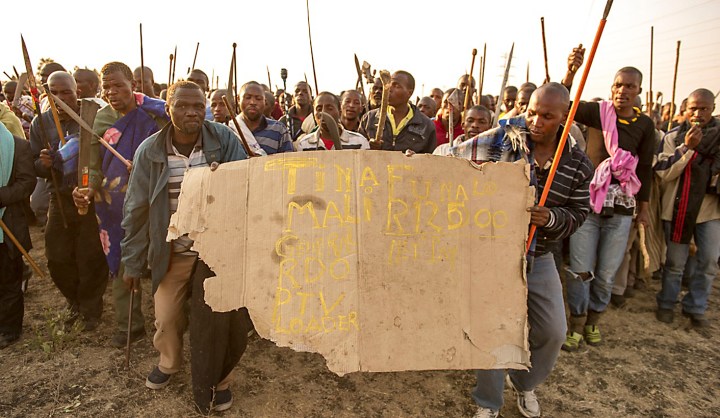South Africa
Marikana Commission: AMCU president flays NUM

According to AMCU president Joseph Mathunjwa, the unrest that led to the massacre at Marikana was probably caused by “sinister forces” linked to NUM’s campaign to “reclaim Lonmin”. Tuesday’s proceedings provided a vivid explanation of why the unrest has largely been described as a union dispute. By SIPHO HLONGWANE.
Joseph Mathunjwa, the president of the Association of Mineworkers and Construction Union (AMCU), was one of the last friendly, outsider faces that dozens of miners who were killed on 16 August saw. He was kept abreast of the escalating violence and unrest by Lonmin executives some weeks before, and attempted to convince the miners to bow to police demands just minutes before the massacre began.
Mathunjwa’s union has been closely involved in the tragedy – though of course it will argue at the Marikana Commission of Inquiry that the union was blameless – and he is the public face of the greatest threat to the dominant National Union of Mineworkers (NUM) since the 1980s.
The main negotiating partner at Lonmin was NUM, but workers had been growing increasingly disgruntled with it, and wanted AMCU to replace it.
Speaking on Tuesday at the commission, Mathunjwa described the unrest as having come from the workers themselves without the prompting of AMCU, and both Lonmin and NUM resisting in a way that led to deaths. He was led in evidence by Tim Bruinders SC, who is representing the union at the inquiry.
Lonmin’s vice-president of human capital and external affairs, Barnard Mokwena, contacted Mathunjwa sometime in July to let him know that the workers were planning to march on company headquarters to deliver a memorandum. He then advised Mathunjwa to set up an urgent meeting with all the unions to resolve the matter as quickly as possible. However, nothing substantial happened.
It was only in the second week of August that Mathunjwa heard of the now infamous R12,500 demand from the rock-drill operators. He then learned that Lonmin would oppose the march, since it was not legally protected. The union decided not to oppose the company’s intention to have the march declared illegal.
On 12 August, Mokwena sent a text message to Mathunjwa. It read: “Hey broer, 4 people shot at Wonderkop, call an urgent meeting with your members.” This was after Lonmin workers marched on NUM offices (we have heard at the commission that the intention may have been to burn them down), and met two security officers who fired on the crowd and were in turn brutally murdered. By then, AMCU general secretary Jeff Mphahlele and national organiser Dumisani Nkalitshana had gone to the area where the protesting miners were gathering.
Following that meeting, AMCU held a press conference on Tuesday 14 August, at which Mathunjwa blamed NUM for escalating the situation by trying to claw back their 50% + 1 majority that would automatically make them the only bargaining partner at the company.
“Without laying blame, we suspect sinister forces are behind this. We heard of the NUM’s campaign to reclaim Lonmin. It is a campaign that is ongoing and involves top political officials,” Mathunjwa said.
NUM was supposed to lose its bargaining power sometime in October 2012, according to AMCU, after the number of workers it represented dropped precipitously, but the company granted the union three months to try and make up its membership numbers.
The day before the police massacre, Mathunjwa, Mokwena and NUM president Senzeni Zokwana argued angrily on SAfm during an interview. The exchange was aired at the commission.
The two unions blamed each other for the 10 lives that had already been claimed by the conflict. It was this interview that framed the issue in the public consciousness as a spat between competing unions. The reality has turned out to be far more complicated than that, even if the rivalry played a vital component.
Mathunjwa said, “People must refrain from violence. When you lose members it doesn’t mean you have to kill people. People have freedom of association. In 1994 we voted for that freedom.”
Zokwana replied that the Lonmin guards who were deployed to guard NUM’s offices were “killed AMCU-style”.
Some people were coerced to go to the meeting areas, the NUM president said. “People have been forced to go to that mountain. They have been calling us. They are saying ‘we want to come back to work but the level of intimidation is high’. As NUM, we are saying let everybody go back to work. Get everybody disarmed, get those responsible for the murders arrested,” he said.
Mokwena said in the same interview that the company would gladly talk to the workers if they would agree to disarm. The company also denied that it had fuelled the unrest by giving some of the rock-drill operators a R700 bonus, since it was not given outside of bargaining agreements.
While the commission’s terms of reference place most of the weight on the actions of the police on 16 August (and the motivations), the union rivalry will likely play a big part too, as it actually started in 2010 when several disgruntled NUM leaders left to form their own union, and became violent in nature at Impala Platinum much earlier in the year. But we are still far from learning the truth of what really happened.
The hearing continues. DM
Photo by Greg Marinovich


















